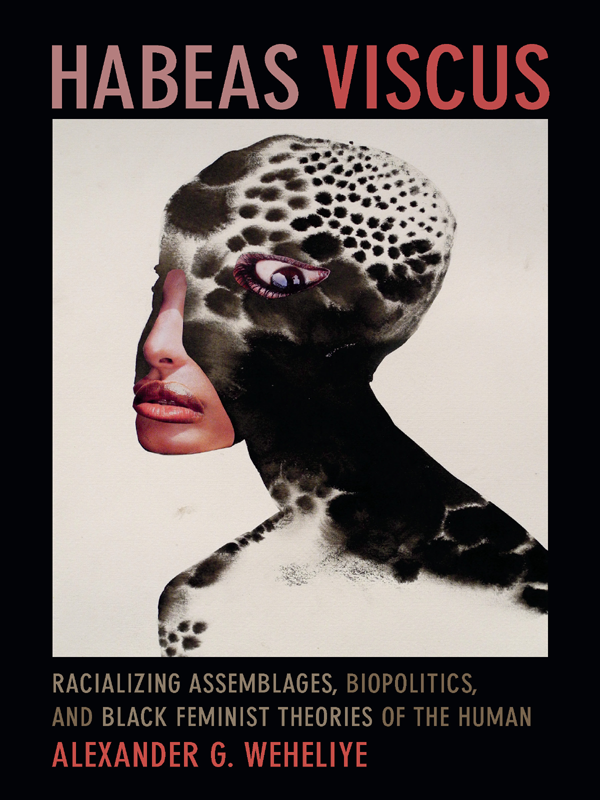Alexander G. Weheliye: Habeas Viscus: Racializing Assemblages, Biopolitics, and Black Feminist Theories of the Human (2014)
Filed under book | Tags: · assemblage, bare life, biopolitics, black people, feminism, freedom, human, property, race, racialization, racism, slavery, theory

“Habeas Viscus focuses attention on the centrality of race to notions of the human. Alexander G. Weheliye develops a theory of ‘racializing assemblages,’ taking race as a set of sociopolitical processes that discipline humanity into full humans, not-quite-humans, and nonhumans. This disciplining, while not biological per se, frequently depends on anchoring political hierarchies in human flesh. The work of the black feminist scholars Hortense Spillers and Sylvia Wynter is vital to Weheliye’s argument. Particularly significant are their contributions to the intellectual project of black studies vis-à-vis racialization and the category of the human in western modernity. Wynter and Spillers configure black studies as an endeavor to disrupt the governing conception of humanity as synonymous with white, western man. Weheliye posits black feminist theories of modern humanity as useful correctives to the ‘bare life and biopolitics discourse’ exemplified by the works of Giorgio Agamben and Michel Foucault, which, Weheliye contends, vastly underestimate the conceptual and political significance of race in constructions of the human. Habeas Viscus reveals the pressing need to make the insights of black studies and black feminism foundational to the study of modern humanity.”
Publisher Duke University Press, Durham, 2014
ISBN 9780822356912, 0822356910
x+209 pages
Reviews: Ashon Crawley (LARB, 2015), Marianna Szczygielska (Parallax, 2015), Aditi Surie von Czechowski (Comp Stud South Asia, Africa and Middle East, 2015), Marianela Munoz and Charles Holm (Afro-Paradise, 2015), Megan H. Glick (Hypatia Rev, 2015), Shelleen Greene (Somatechnics, 2016), Amber Jamilla Musser (philoSOPHIA, 2016), Gabriela Radulescu (Allegra Lab, 2016), Ander Mendiguren Nebreda (Athenea Digital, 2017, ES).
Comment (0)Alessandro Delfanti: Biohackers: The Politics of Open Science (2013)
Filed under book | Tags: · biology, capitalism, code, commons, diy biology, freedom, gift economy, hacker culture, hacker ethic, hacking, information, intellectual property, open science, open source, science, software, technology

“Biohackers explores fundamental changes occuring in the circulation and ownership of scientific information. Alessandro Delfanti argues that the combination of the ethos of 20th century science, the hacker movement and the free software movement is producing an open science culture which redefines the relationship between researchers, scientific institutions and commercial companies.
Biohackers looks at the emergence of the citizen biology community ‘DIYbio’, the shift to open access by the American biologist Craig Venter and the rebellion of the Italian virologist Ilaria Capua against WHO data-sharing policies.
Delfanti argues that these biologists and many others are involved in a transformation of both life sciences and information systems, using open access tools and claiming independence from both academic and corporate institutions.”
Publisher Pluto Press, London, 2013
Creative Commons Attribution-NonCommercial-NoDerivs 3.0 License
ISBN 9781849649070
176 pages
Review (Alice Bell, The Guardian, 2013)
Review (Stefano Golinelli and Luc Henry, Science, 2014)
EPUB
PDF (added on 2018-10-17)
Issuu
Heidi Boghosian: Spying on Democracy: Government Surveillance, Corporate Power, and Public Resistance (2013)
Filed under book | Tags: · democracy, freedom, intelligence agency, internet, law, privacy, surveillance

“Until the watershed leak of top-secret documents by Edward Snowden to the Guardian UK and the Washington Post, most Americans did not realize the extent to which our government is actively acquiring personal information from telecommunications companies and other corporations. As made startlingly clear, the National Security Agency (NSA) has collected information on every phone call Americans have made over the past seven years. In that same time, the NSA and the FBI have gained the ability to access emails, photos, audio and video chats, and additional content from Google, Facebook, Yahoo, Microsoft, YouTube, Skype, Apple, and others, allegedly in order to track foreign targets.
In Spying on Democracy, National Lawyers Guild Executive Director Heidi Boghosian documents the disturbing increase in surveillance of ordinary citizens and the danger it poses to our privacy, our civil liberties, and to the future of democracy itself. Boghosian reveals how technology is being used to categorize and monitor people based on their associations, their movements, their purchases, and their perceived political beliefs. She shows how corporations and government intelligence agencies mine data from sources as diverse as surveillance cameras and unmanned drones to iris scans and medical records, while combing websites, email, phone records and social media for resale to third parties, including U.S. intelligence agencies.
The ACLU’s Michael German says of the examples shown in Boghosian’s book, “this unrestrained spying is inevitably used to suppress the most essential tools of democracy: the press, political activists, civil rights advocates and conscientious insiders who blow the whistle on corporate malfeasance and government abuse.” Boghosian adds, “If the trend is permitted to continue, we will soon live in a society where nothing is confidential, no information is really secure, and our civil liberties are under constant surveillance and control.” Spying on Democracy is a timely, invaluable, and accessible primer for anyone concerned with protecting privacy, freedom, and the U.S. Constitution.”
Foreword by Lewis Lapham
Publisher City Lights, San Francisco, 2013
Open Media series
ISBN 0872865991, 9780872865990
352 pages

